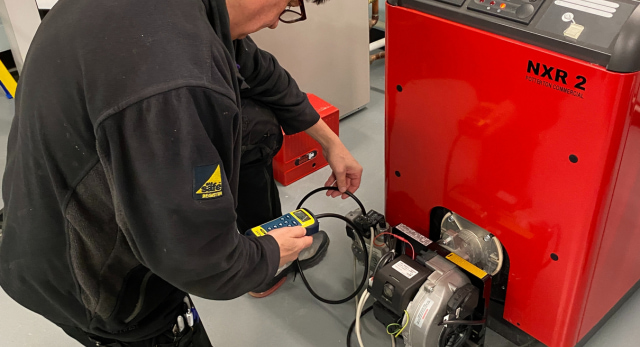RIDDOR stands for the Reporting of Injuries, Diseases and Dangerous Occurrences Regulations. It’s a set of UK health and safety laws that require employers, the self-employed, and those in control of work premises to report and record certain serious workplace incidents. This includes specific injuries, diagnosed occupational diseases, dangerous occurrences and work related deaths.

RIDDOR isn’t just red tape. It’s about identifying risks, learning from mistakes, and creating safer workplaces for everyone. If you’re running a business, managing a site, or even just working on the tools, understanding RIDDOR is essential.
Why is RIDDOR Important?
Failing to comply with RIDDOR can land you in serious trouble. We’re talking fines, legal action, and even prison in extreme cases. But it’s not just about avoiding penalties. RIDDOR:
- Helps identify workplace risks and trends.
- Triggers investigations that can prevent future accidents.
- Demonstrates your commitment to health and safety (which is good for morale, reputation, and the bottom line).
- Keeps you compliant with UK law. No one wants the HSE knocking on the door.
Who Needs to Report Under RIDDOR?
Not everyone needs to file a report. Just the “responsible person” does. That’s usually:
- Employers (for their workers)
- Self-employed people (for themselves)
- People in control of work premises (like site managers or landlords)
Employees and the public don’t report directly under RIDDOR, but if you witness something dodgy, you should absolutely tell the person in charge!
What Incidents Must Be Reported Under RIDDOR?
Not every scraped knee or paper cut makes the cut. RIDDOR focuses on the big stuff, incidents that are serious, work-related, and meet specific criteria. Here’s what you need to know:
1. Work-Related Deaths
Any fatality caused by a workplace accident (including non-workers, like visitors or customers).
2. Specified Injuries to Workers
These include:
- Fractures (except fingers, thumbs, toes)
- Amputations
- Loss of sight (temporary or permanent)
- Serious burns (covering more than 10% of the body, or damaging eyes, respiratory system, or vital organs)
- Scalpings (where the skin is separated from the head)
- Loss of consciousness caused by head injury or asphyxia
- Crush injuries to the head or torso, causing internal organ damage
- Injuries from working in confined spaces.
3. Over-Seven-Day Injuries
If a worker is unable to perform their normal duties for more than seven consecutive days after an accident, it’s reportable. (Don’t count the day of the accident, but do include weekends and rest days).
4. Occupational Diseases
Diagnosed by a doctor and caused by work activities, such as:
- Carpal tunnel syndrome
- Severe cramp of the hand or forearm
- Occupational dermatitis
- Hand-arm vibration syndrome
- Occupational asthma
- Tendonitis or tenosynovitis
- Certain cancers and biological agent exposures.
5. Dangerous Occurrences
These are “near-miss” events with the potential to cause serious harm, such as:
- Collapse of scaffolding or lifting equipment
- Explosions or fires
- Uncontrolled release of substances (like chemicals or gas)
- Electrical short circuits causing fire or explosion
- Structural collapses.
6. Injuries to Non-Workers
If a member of the public is injured on your premises and taken directly to hospital for treatment, you must report it.
What Doesn’t Need to Be Reported?
- Minor injuries (cuts, bruises, sprains).
- Absences of less than seven days (unless it’s a specified injury).
- Incidents that aren’t work-related.
- Gradual injuries with no specific incident (unless diagnosed as an occupational disease).
How to Make a RIDDOR Report
Step 1: Identify the Incident
- Is it work-related?
- Does it meet the criteria above?
- Are you the “responsible person”?
Before making a RIDDOR report, you must confirm that the incident occurred as a result of work activities, fits one of the specific categories outlined by RIDDOR (such as a specified injury, occupational disease, dangerous occurrence, or fatality), and that you are the designated “responsible person” (typically the employer, self-employed, or person in control of the premises) legally required to report.
Step 2: Report Promptly
- Fatalities and specified injuries: Report without delay (ideally within 10 days).
- Over-seven-day injuries: Report within 15 days.
- Occupational diseases: Report as soon as you receive a diagnosis.
- Dangerous occurrences and gas incidents: Report immediately.
Timely reporting is crucial. Fatalities and major injuries should be reported as soon as possible, ideally within 10 days, while over-seven-day injuries must be reported within 15 days, and occupational diseases as soon as they are diagnosed; dangerous occurrences and gas incidents require immediate notification to ensure compliance and enable swift action by the authorities.
Step 3: Use the Right Channel
- Online: Most incidents are reported via the HSE’s RIDDOR portal.
- Phone: Only for fatalities and major injuries (see HSE for the current number).
Timely reporting is crucial. Fatalities and major injuries should be reported as soon as possible, ideally within 10 days, while over-seven-day injuries must be reported within 15 days, and occupational diseases as soon as they are diagnosed; dangerous occurrences and gas incidents require immediate notification to ensure compliance and enable swift action by the authorities.
Step 4: Keep Records
You must keep records of all reportable incidents for at least three years (but five to six years is safer for insurance and legal claims). Records can be digital or paper, but they must include:
- Date and time of incident
- Details of those involved
- Description of the incident and injuries
- Place where it happened
- What action was taken
It’s a legal requirement to maintain organised records of all reportable incidents for at least three years (though keeping them for five to six years is best practice), ensuring you include all relevant details, such as dates, those involved and a factual account, which supports compliance, future investigations, and potential insurance claims.

RIDDOR in Practice: Real-World Examples
Here’s how RIDDOR works in the wild:
| Example | Is it Reportable? | Why? |
|---|---|---|
| Warehouse worker breaks arm falling from ladder | Yes | Specified injury (fracture) |
| Office worker off for 10 days after slipping | Yes | Over-seven-day injury |
| Customer taken to A&E after tripping in shop | Yes | Injury to a non-worker taken to hospital |
| Engineer finds faulty gas boiler leading to confirmed CO poisoning | Yes | Dangerous gas incident – Reportable to Gas Safe, not the HSE |
| Worker diagnosed with hand-arm vibration syndrome | Yes | Occupational disease |
| Forklift bumps into racking, no injuries | No | Not reportable unless it’s a dangerous occurrence (e.g. collapse) |
RIDDOR for Construction Workers, Plumbers, Gas Engineers, and Electricians
RIDDOR is especially critical for those working in construction and building services, where the risks are high and the consequences of non-compliance can be severe. Data from the Health and Safety Executive revealed the scale of the challenge: a staggering 47,000 people working in construction trades suffered a non-fatal injury at work between 2021/22 and 2023/24. Even more sobering, the construction industry experienced nearly one fatality every week, with 51 fatal injuries recorded in 2023/24 alone. These figures highlight just how important it is for everyone in the sector, whether you’re on the tools or managing a site, to understand and meet your RIDDOR obligations.
Construction Workers
Construction sites are high-risk environments, so RIDDOR reporting is especially important. All deaths and serious injuries on site, such as fractures (excluding fingers, thumbs, and toes), amputations, permanent loss of sight, crush injuries to the head or body, serious burns, scalping requiring hospital treatment, and loss of consciousness due to head injury or asphyxia, must be reported. Over-seven-day injuries, where a worker cannot perform their normal duties for more than seven consecutive days, are also reportable. Dangerous occurrences, like scaffold collapses, electrical incidents, or the unintentional release of hazardous substances, must be reported immediately to help prevent future accidents.
Plumbers
For plumbers, RIDDOR reporting often centres around work-related injuries and dangerous occurrences involving water or heating systems. If you or a colleague suffer a serious injury (such as a fracture, amputation, or burn) while working, or if there’s a dangerous occurrence, like an unvented water cylinder explosion or major water leak that could have caused harm, it must be reported. Over-seven-day absences due to injury are also notifiable. Additionally, if you come across gas-related incidents while working on heating systems, you may have a duty to report under RIDDOR, especially if you’re Gas Safe registered.
Gas Engineers
Gas engineers have specific and critical obligations under RIDDOR. You must report any work-related accident that causes death or a specified injury, but you’re also legally required to report dangerous gas fittings or appliances. IGEM produced the Gas Industry Unsafe Situations Procedure (GIUSP) to bring consistency and reliability to how gas engineers deal with unsafe situations and the reporting of RIDDOR.
Situations where a gas appliance or installation are found to be so dangerous, i.e. that it could result in death, loss of consciousness, or require hospital treatment, such as accidental gas leaks, incomplete combustion, or inadequate removal of combustion products, would result in a report to Gas Safe. If there had been an explosion or exposure to CO confirmed in a medical environment, then a RIDDOR report would need to be made to the HSE. There is a subtle difference in that if there is a potential risk, Gas Safe would need to be informed, whereas if there is an actual incident, HSE would need to be informed via a RIDDOR report.
Keeping detailed records of all reportable incidents, including gas-related near misses, is essential for ensuring compliance and maintaining public safety.
Electricians
Electricians face unique risks, particularly from electrical shocks, burns, and fires. Any incident where an electrician (or anyone else) suffers a reportable injury, like a serious burn, electric shock leading to loss of consciousness, or other specified injuries, must be reported. Dangerous occurrences, such as electrical short circuits causing fire or explosion, or the collapse of equipment, are also notifiable under RIDDOR. Over-seven-day injuries are common in this trade and must be reported if they prevent normal work for more than a week.
Why Does This Matter?
Accurate and timely RIDDOR reporting helps identify hazards, prevent future incidents, and demonstrates your commitment to health and safety. For construction workers, plumbers, gas engineers, and electricians, it’s a legal duty that protects you, your colleagues, and the public.
If you’re unsure whether an incident is reportable, always err on the side of caution and consult the HSE’s official guidance or reach out to your health and safety officer.
Common RIDDOR Mistakes (And How to Avoid Them)
One of the most common RIDDOR mistakes is not recognising which incidents are actually reportable. To avoid this, use a clear checklist or flowchart so you can quickly determine whether an event meets the RIDDOR criteria. Missing reporting deadlines is another frequent pitfall, but setting up reminders or using automated systems can help ensure you never let a report slip through the cracks.
Under-reporting near-misses is also a significant issue; regular training will help your team spot and report dangerous occurrences before they escalate into something more serious. Poor record keeping can lead to compliance headaches and lost information, so make sure you centralise and securely store all RIDDOR-related records. Finally, don’t focus solely on immediate injuries. Remember to track and report long-term conditions and occupational diseases, as these are just as important for workplace safety and legal compliance.
What Happens If You Don’t Comply?
Non-compliance isn’t just a slap on the wrist. Those who don’t comply with RIDDOR can face:
- Fines and legal action: The HSE can and will prosecute.
- Insurance headaches: Claims may be denied if you haven’t followed RIDDOR.
- Reputational damage: No one wants to work for a company that ignores safety.
- Prison: In extreme cases, custodial sentences are possible.
RIDDOR vs. Other Reporting Requirements
| Requirement | What’s Covered | Who Reports | Where? |
|---|---|---|---|
| Accident Book | All workplace accidents | Anyone | On-site accident book |
| RIDDOR | Only specified incidents | Responsible person | HSE |
| Insurance Claims | Incidents affecting claims | Responsible person | Insurer |
| Internal Investigation | All incidents | Employer | Internal records |
Final Word
RIDDOR is a vital tool for making workplaces safer, more transparent, and ultimately more productive. By understanding your responsibilities and embedding RIDDOR processes into your daily operations, you’re not just ticking a legal box; you’re actively contributing to a culture of safety that protects your team, your business, and the wider public.
For construction workers, plumbers, gas engineers, and electricians, the risks on site are real and ever-present. Prompt and accurate reporting of incidents under RIDDOR doesn’t just help you stay on the right side of the law; it also provides valuable data that can be used to prevent future accidents, improve training, and drive up standards across the industry. Keeping good records and encouraging open reporting can even boost morale, as your workforce knows their wellbeing is taken seriously.
At Logic4training, we’ve seen first-hand how effective health and safety practices, including robust RIDDOR compliance, can transform businesses. Our training courses are designed to give you the practical knowledge and confidence to handle reporting requirements with ease, whether you’re a sole trader or managing a large team. We’re here to help you stay compliant, competitive, and above all, safe.
Remember, if you’re ever unsure about whether an incident is reportable or how to handle a tricky situation, don’t hesitate to consult the official HSE guidance or reach out to our expert team. Staying proactive and informed is the best way to protect your people and your business, because when it comes to health and safety, there’s no such thing as being too careful.
Top Tips for RIDDOR Compliance
- Train your team: Make sure everyone knows what to look for and how to report.
- Keep it simple: Use clear forms and checklists.
- Review regularly: Update your policies and procedures as laws change.
- Stay organised: Keep records secure and accessible.
- Ask for help: If in doubt, contact the HSE or a health and safety consultant (or give us a shout at Logic4training).
FAQs
What does RIDDOR stand for?
RIDDOR stands for the Reporting of Injuries, Diseases and Dangerous Occurrences Regulations. It’s UK law requiring certain workplace incidents to be reported to the HSE.
Who is responsible for making a RIDDOR report?
The employer, self-employed person, or whoever is in control of the work premises is responsible, not the injured person or the public.
What types of incidents must be reported under RIDDOR?
Work-related deaths, specified injuries, over-seven-day injuries, occupational diseases, dangerous occurrences, and injuries to non-workers taken to hospital.
How long must RIDDOR records be kept?
At least three years, but five to six years is recommended for legal and insurance purposes.
What happens if I don’t report a RIDDOR incident?
You could face fines, legal action, insurance issues, reputational damage, and in serious cases, prison.









